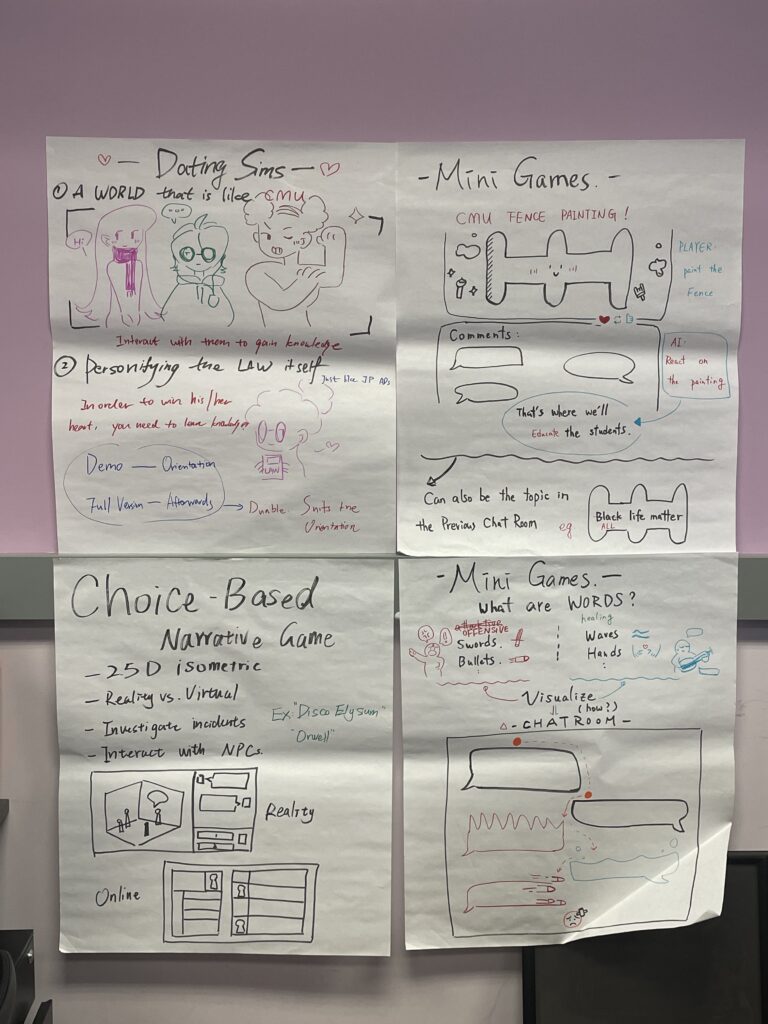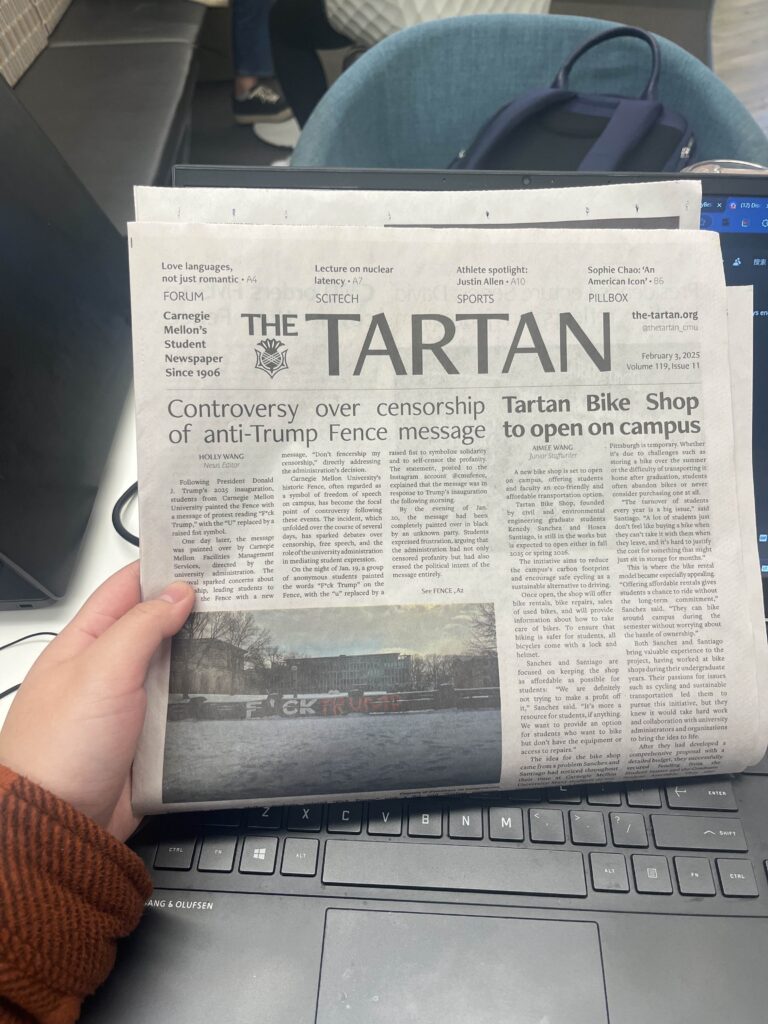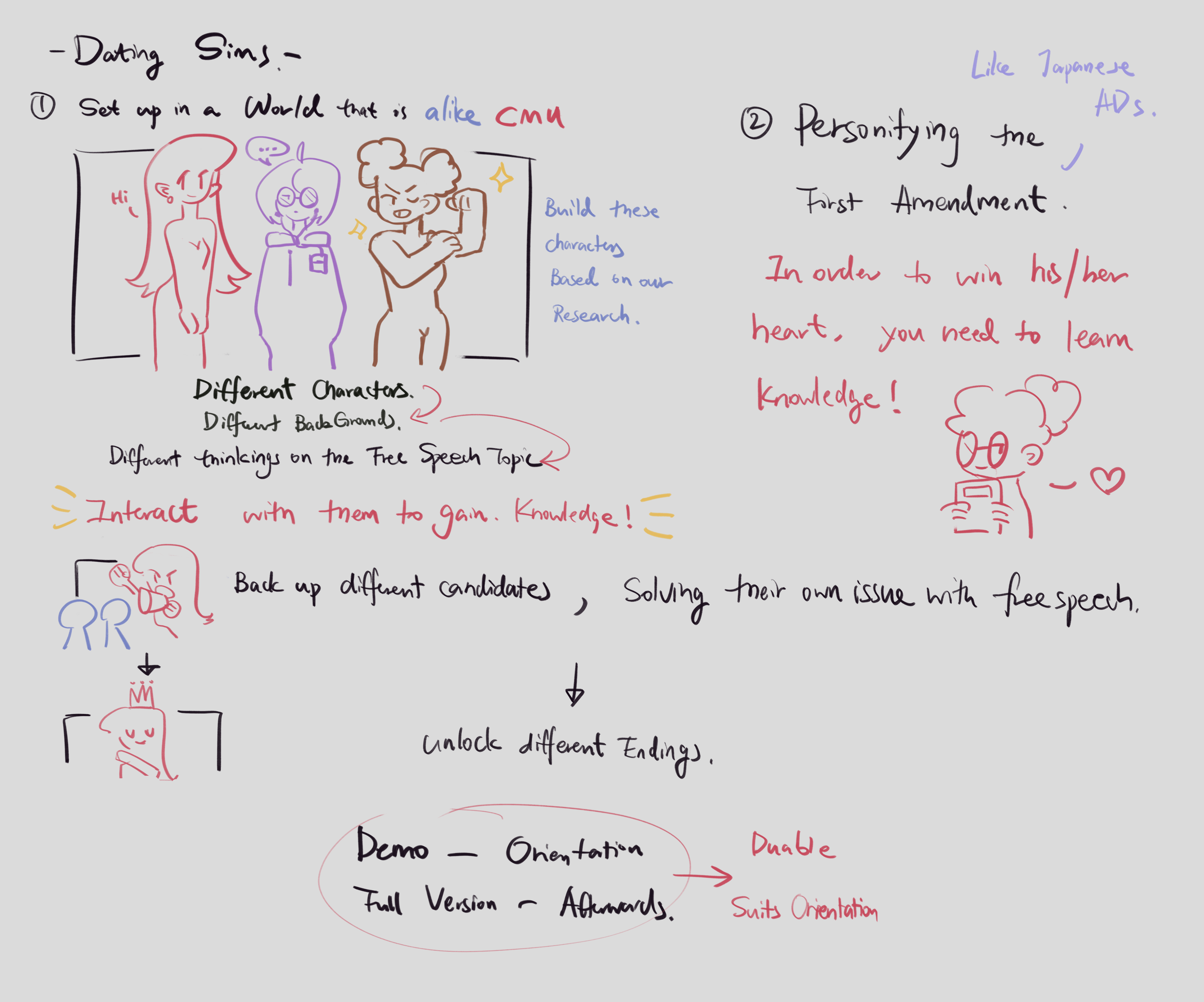This week, we continued refining our transformational goal, recognizing its importance as the foundation of our project. Establishing a strong core early on will help prevent uncertainty and repeated revisions down the line.
| Framework | Current Idea | Next Step |
| High-level purpose | Bring awareness, understand knowledge of Fos and AF | SME consultation |
| Audience & Context | CMU Student | Campus survey |
| Player Transformation | Be informed about the law, policies, and can distinguish free speech | Create engaging game experience |
| Barriers | Controversial topics | Waiting for survey result |
| Prior Works | Serious games, transformational game from ETC | CMU Student |
| Assessment | Emotional arc, playtest feedback | Playtest opportunity |
| Domain Concepts | Free Speech | Research, SME, survey |
Game Design Concepts
Building on our previous brainstorming session, the team consolidated several ideas:
- Narrative-driven choice-based game – Inspired by Disco Elysium and Detroit: Become Human, this concept immerses players in the role of a student navigating a semester, making choices that lead to different endings. A variation of this idea involves players taking on the role of a forum moderator, reviewing posts and determining which ones are legally protected, ethically acceptable, or violate policies.
- Abstract metaphorical experiences – A more symbolic approach using abstract visuals and 2D dialogue systems, where players interact with an AI to explore different interpretations of free speech.
- Dating simulator – Based on student feedback, Moe proposed a dating sim format, where players either help different NPCs resolve free speech-related issues on campus or “date” personified laws and policies to better understand their nuances.

Refining the Concepts
After discussing these ideas with our instructor, we selected three directions for further development:
- Choice-based single-player experience – Players take on different character roles to explore free speech dilemmas through narrative and decision-making, leading to multiple outcomes.
- Multiplayer CMU orientation game – A short-form multiplayer experience set within CMU’s orientation, incorporating mini-games that naturally introduce free speech concepts without the challenge of reaching a broad audience.
- Dating simulator – A fresh and engaging approach that appeals to students by blending humor with educational elements.
Our instructor also suggested meeting with a subject matter expert next week to refine our approach and ensure the content is accurate and impactful. In preparation for our Quarters Presentation, we compiled and structured these ideas to present them effectively.
Research & Preparation
Since transformational games tackle serious topics, it is crucial to conduct thorough research to ensure accuracy and avoid misrepresentation. The team divided tasks and explored various aspects, including:
- U.S. legal definitions of free speech
- Relevant court cases in Pennsylvania
- Free speech policies at CMU as a private institution

Quarters Feedback & Key Insights
During our Quarters Presentation, we received valuable feedback that will shape our next steps:
- Expanding character interactions – Introduce characters that represent social norms, kindness, and CMU policies (potentially as dateable characters or advisors).
- Moral vs. legal dilemmas – Design scenarios where actions may be legally protected but socially questionable, such as making a legally acceptable but offensive statement.
- Ambiguity in communication – Include phrases open to interpretation (e.g., “Shoot the mayor” – with a gun or a camera?) to challenge players’ understanding of context.
- International perspectives – While the game focuses on U.S. and CMU policies, a brief comparison with other countries could add depth.
- Layered approach to free speech – Break down different aspects into clear categories:
- Protected Speech
- Social Acceptability
- Legal Liability (e.g., being sued for statements)
- University-Specific Rules
- Real-world references – Consider using examples from “Decisions That Matter” and other real-life free speech simulations.
- Balancing humor and seriousness – Use comedy and counterintuitive situations to encourage critical thinking while maintaining engagement.
- Encouraging player discussions – Explore ways to prompt dialogue about free speech issues both within the game and in real-world interactions.
- Dating sim considerations – If we pursue this direction, we should research dating etiquette to ensure gameplay feels natural.
- Prototyping strategies – Use paper prototypes and improv-based methods to quickly test and refine concepts.
- Relatable campus scenarios – Simulate common student experiences involving free speech challenges.
Challenges & Open Questions
Technical Challenges
- Server infrastructure – How will players connect and interact in a multiplayer setting?
- Accessibility concerns – Could making the game too accessible dilute its impact?
Defining the Deliverable
- Target audience and experience – Should the game be a group experience? If so, for how many players?
- Logistics – When and where will the playtests take place? Could we integrate the game into orientation emails and track engagement?
Handling Offensive Content
- Player-generated content – Will players have the ability to create offensive material? If so, how will we moderate it?
Clarifying the Goal
- Is the purpose to make players better people or simply to educate them? (At this stage, we are leaning toward the latter.)
Content Scope
- Which nuances of free speech should we focus on?
- What real-life scenarios are most relevant to CMU students?
- What behavioral changes do we want to encourage?
- How do we create empathy in the game?
Next Steps
With these insights, we will finalize our direction after meeting with Dean Richard Scheines next week. His feedback will help refine our approach and ensure our game meaningfully addresses free speech in a way that resonates with our audience.
